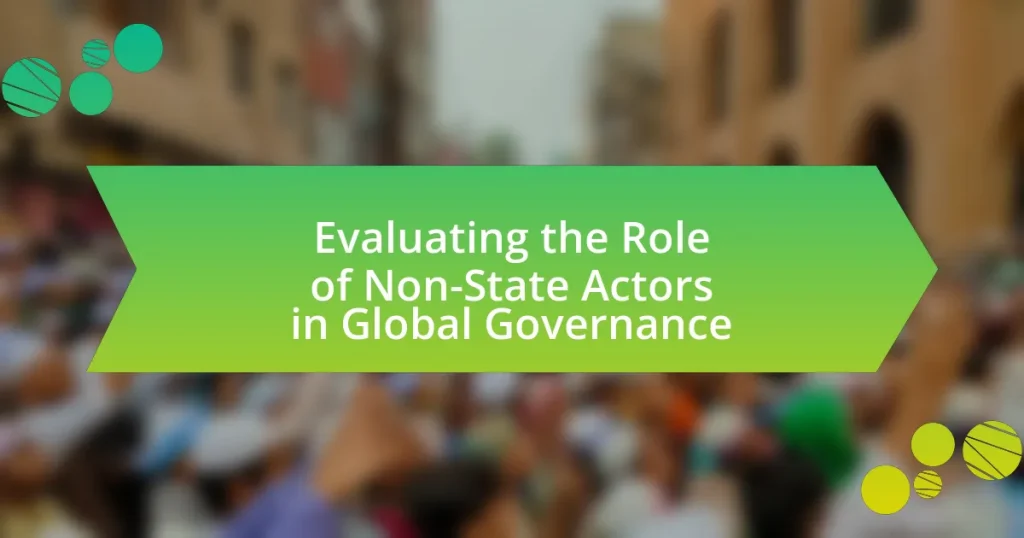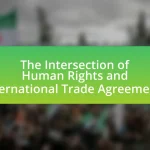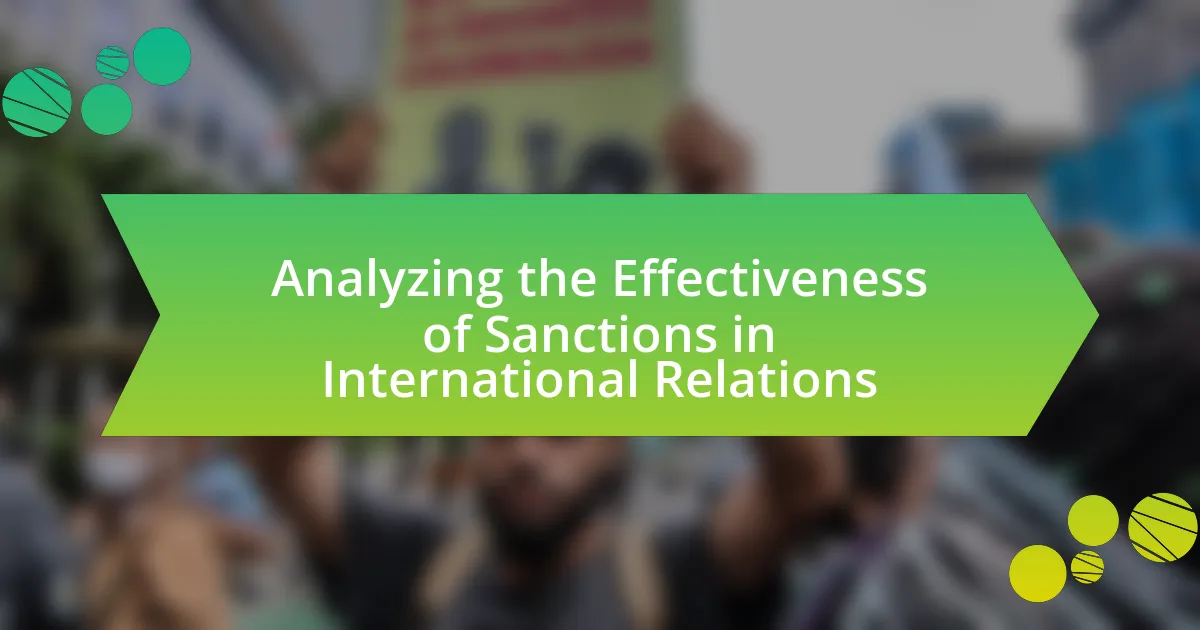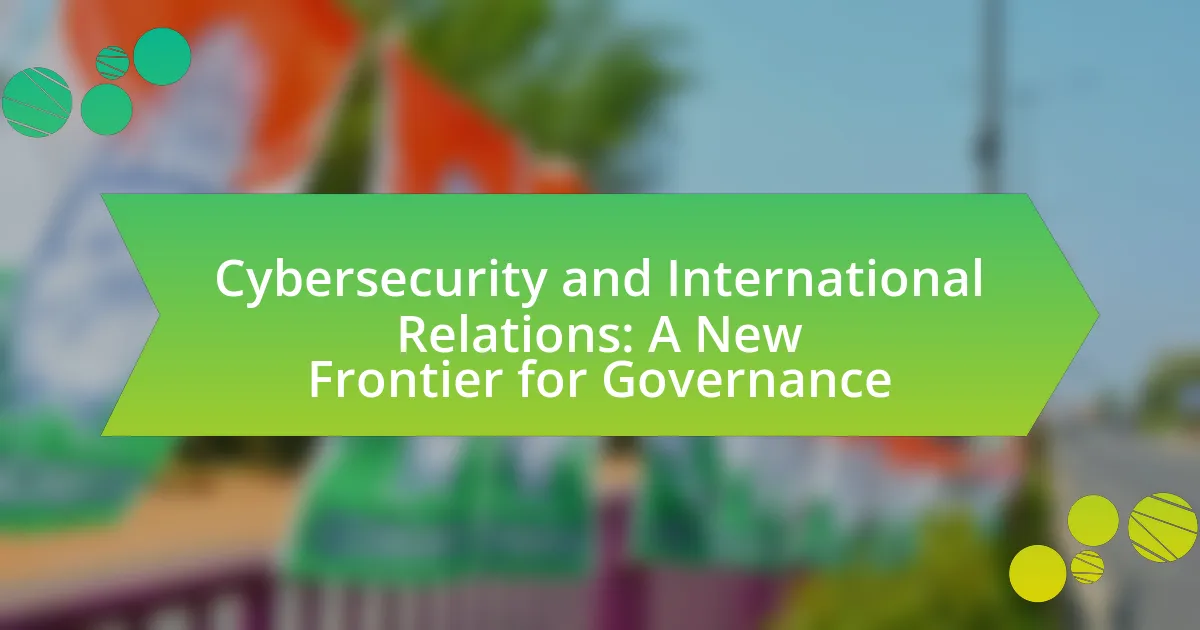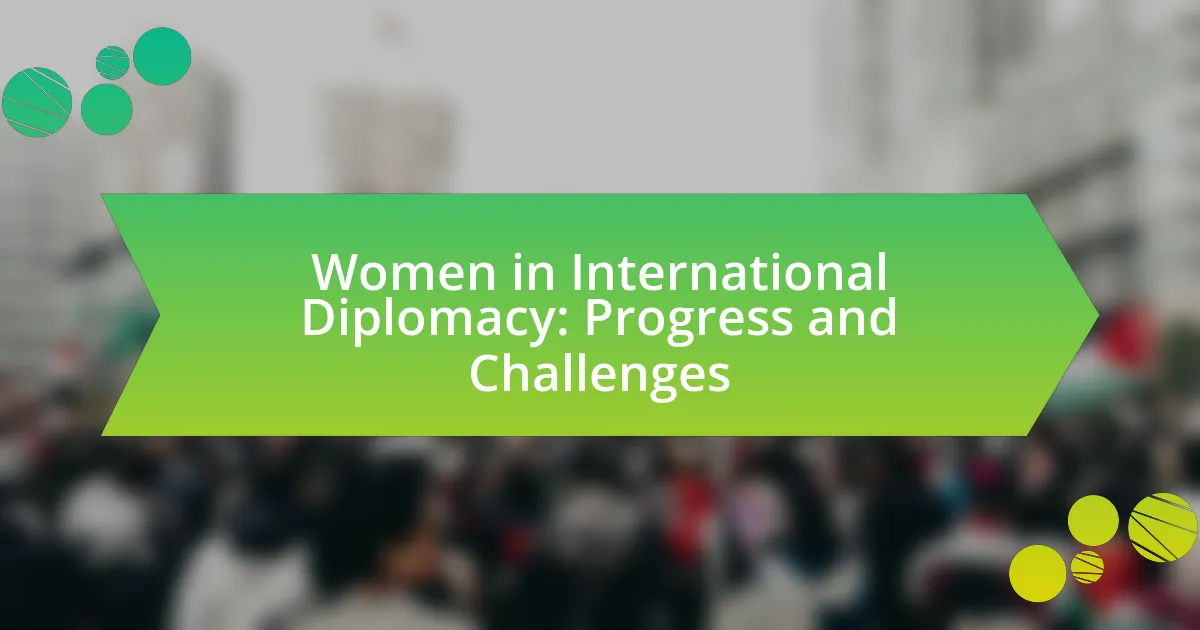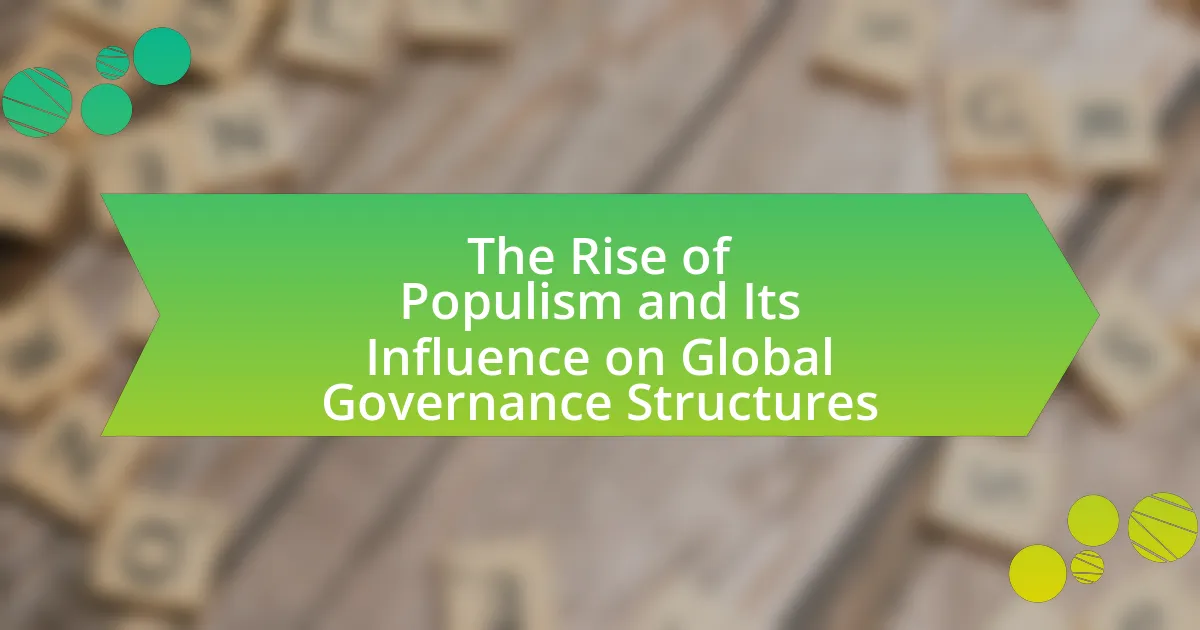Non-State Actors in global governance are entities that influence international relations and policy-making without formal governmental affiliation, including NGOs, multinational corporations, and civil society groups. This article evaluates their roles, differences from state actors, and the various types of non-state actors, highlighting their significant contributions to global issues such as climate change, human rights, and economic development. It also examines the challenges they face, their strategies for enhancing influence, and the impact of public perception on their effectiveness. Furthermore, the article discusses specific contributions of non-state actors in environmental governance and human rights advocacy, emphasizing best practices for effective engagement in global governance.

What are Non-State Actors in Global Governance?
Non-state actors in global governance are entities that influence international relations and policy-making without being affiliated with any government. These actors include non-governmental organizations (NGOs), multinational corporations, international organizations, and civil society groups, which play significant roles in addressing global issues such as climate change, human rights, and economic development. For instance, NGOs like Amnesty International advocate for human rights on a global scale, while multinational corporations can impact economic policies through their operations and lobbying efforts. Their involvement is crucial as they often fill gaps left by states, mobilize resources, and provide expertise, thereby shaping the global governance landscape.
How do Non-State Actors differ from State Actors?
Non-State Actors differ from State Actors primarily in their lack of formal governmental authority and sovereignty. State Actors, such as countries and their governments, possess the legal authority to create and enforce laws, conduct foreign relations, and engage in diplomacy. In contrast, Non-State Actors, which include organizations like NGOs, multinational corporations, and terrorist groups, operate independently of state control and do not have recognized sovereignty. For example, the International Red Cross, a prominent Non-State Actor, provides humanitarian aid without being a government entity, while the United Nations represents State Actors in international governance. This distinction highlights the varying roles and influences these actors have in global governance, with Non-State Actors often filling gaps in areas such as humanitarian assistance and advocacy where State Actors may be limited.
What types of Non-State Actors exist in global governance?
Non-State Actors in global governance include non-governmental organizations (NGOs), multinational corporations (MNCs), international organizations, social movements, and transnational advocacy networks. NGOs, such as Amnesty International, influence policy through advocacy and humanitarian efforts. MNCs, like Apple and ExxonMobil, impact economic policies and environmental regulations due to their global reach and resources. International organizations, including the United Nations and World Health Organization, facilitate cooperation among states and address global issues. Social movements, such as climate activism, mobilize public opinion and pressure governments for change. Transnational advocacy networks connect various stakeholders to promote specific causes, exemplified by the global campaign against landmines. Each type of non-state actor plays a distinct role in shaping global governance dynamics.
What roles do Non-State Actors play in international relations?
Non-State Actors play crucial roles in international relations by influencing policy, shaping public opinion, and providing services that states may not address. These actors include non-governmental organizations (NGOs), multinational corporations, and terrorist groups, each impacting global governance in distinct ways. For instance, NGOs like Amnesty International advocate for human rights and environmental issues, often pressuring governments to adopt specific policies. Multinational corporations, such as Apple and ExxonMobil, wield economic power that can affect trade agreements and labor standards globally. Additionally, terrorist organizations can destabilize regions, prompting international responses and security measures. The involvement of these actors demonstrates their significant influence on state behavior and international norms, as evidenced by the increasing collaboration between states and NGOs in addressing global challenges like climate change and humanitarian crises.
Why is the involvement of Non-State Actors important?
The involvement of Non-State Actors is important because they play a crucial role in shaping global governance and influencing policy outcomes. Non-State Actors, such as NGOs, multinational corporations, and civil society organizations, contribute diverse perspectives, resources, and expertise that enhance the effectiveness of governance processes. For instance, according to the United Nations, Non-State Actors are instrumental in addressing global challenges like climate change and human rights, as they mobilize resources and advocate for marginalized communities. Their participation fosters accountability and transparency, leading to more inclusive decision-making that reflects a broader range of interests and needs.
How do Non-State Actors influence policy-making?
Non-State Actors influence policy-making by engaging in advocacy, lobbying, and providing expertise that shapes governmental decisions. These actors, which include non-governmental organizations (NGOs), multinational corporations, and civil society groups, often mobilize public opinion and resources to push for specific policy outcomes. For example, NGOs like Amnesty International have successfully influenced human rights policies by raising awareness and pressuring governments through campaigns and reports. Additionally, multinational corporations can sway economic policies by leveraging their financial power and lobbying efforts, as seen in the influence of the pharmaceutical industry on healthcare regulations. This dynamic demonstrates that non-state actors play a critical role in shaping the policy landscape through direct engagement and strategic influence.
What impact do Non-State Actors have on global issues?
Non-State Actors significantly influence global issues by shaping policies, mobilizing resources, and advocating for social change. These entities, which include non-governmental organizations (NGOs), multinational corporations, and grassroots movements, often fill gaps left by state actors, particularly in areas like humanitarian aid, environmental protection, and human rights advocacy. For instance, NGOs such as Amnesty International and Greenpeace have successfully raised awareness and pressured governments to adopt more progressive policies on human rights and climate change, respectively. Their ability to operate transnationally allows them to address issues that transcend national borders, making them crucial players in global governance.

What challenges do Non-State Actors face in Global Governance?
Non-State Actors face significant challenges in Global Governance, primarily due to their lack of formal authority and recognition. These actors, which include NGOs, multinational corporations, and advocacy groups, often struggle to influence policy-making processes dominated by state actors. For instance, while NGOs may provide valuable expertise and grassroots perspectives, they frequently encounter barriers such as limited access to decision-making forums and insufficient funding, which hinder their effectiveness. Additionally, the diverse interests and agendas of Non-State Actors can lead to fragmentation and competition, complicating collaborative efforts. According to a report by the United Nations Development Programme, the effectiveness of Non-State Actors is often undermined by these structural limitations, which restrict their ability to engage meaningfully in global governance initiatives.
How do legal frameworks affect Non-State Actors?
Legal frameworks significantly influence Non-State Actors by establishing the rules and norms that govern their behavior and interactions. These frameworks can either empower or restrict Non-State Actors, such as NGOs, corporations, and informal groups, by defining their legal status, rights, and responsibilities. For instance, international treaties and national laws can provide legitimacy to Non-State Actors, enabling them to participate in global governance processes, while restrictive regulations can limit their operational capacity and influence. The United Nations Framework Convention on Climate Change illustrates this, as it allows Non-State Actors to engage in climate action, thereby enhancing their role in global governance.
What limitations do Non-State Actors encounter in their operations?
Non-State Actors encounter several limitations in their operations, primarily including lack of formal recognition, limited resources, and regulatory constraints. The absence of formal recognition by state authorities restricts their ability to engage in diplomatic negotiations or access certain international platforms. Limited financial and human resources hinder their capacity to implement large-scale projects or sustain long-term initiatives. Additionally, regulatory constraints imposed by states can obstruct their activities, as many non-state actors must navigate complex legal frameworks that vary by country. These limitations significantly impact their effectiveness and influence in global governance.
How do power dynamics influence the effectiveness of Non-State Actors?
Power dynamics significantly influence the effectiveness of Non-State Actors (NSAs) by determining their access to resources, legitimacy, and influence within global governance frameworks. For instance, NSAs that align with powerful state actors or international organizations often gain enhanced credibility and operational support, which can amplify their impact on policy-making. Conversely, NSAs that operate in opposition to dominant power structures may face marginalization, limiting their ability to effect change. Research indicates that NSAs with strong networks and alliances can leverage these relationships to challenge state authority and advocate for marginalized issues, as seen in the work of organizations like Amnesty International and Greenpeace, which have successfully mobilized public opinion and influenced international treaties. Thus, the interplay of power dynamics shapes the strategic positioning and operational success of NSAs in the global governance landscape.
What strategies can Non-State Actors employ to enhance their influence?
Non-State Actors can enhance their influence through strategic partnerships, advocacy, and leveraging technology. By forming alliances with other organizations, such as NGOs, businesses, or community groups, they can amplify their reach and resources, as seen in the collaboration between the Global Fund and various health organizations to combat diseases. Advocacy efforts, including lobbying and public campaigns, allow them to shape public opinion and policy, exemplified by the impact of climate advocacy groups in influencing international climate agreements. Additionally, utilizing technology, such as social media platforms, enables Non-State Actors to engage a broader audience and mobilize support quickly, as demonstrated by movements like #MeToo, which gained global traction through online platforms.
How can collaboration with State Actors benefit Non-State Actors?
Collaboration with State Actors can significantly benefit Non-State Actors by providing access to resources, legitimacy, and influence in policy-making processes. Non-State Actors, such as NGOs and community organizations, often lack the financial and logistical support that State Actors can offer, which can enhance their operational capacity and outreach. For instance, partnerships with government agencies can lead to funding opportunities and shared expertise, enabling Non-State Actors to implement more effective programs. Additionally, collaboration can enhance the credibility of Non-State Actors, as alignment with State Actors can validate their initiatives and increase public trust. This legitimacy can facilitate greater engagement with stakeholders and improve advocacy efforts, as seen in various global health initiatives where NGOs partnered with governments to combat diseases, resulting in improved health outcomes and policy changes.
What role does public perception play in the effectiveness of Non-State Actors?
Public perception significantly influences the effectiveness of Non-State Actors (NSAs) by shaping their legitimacy and operational capacity. When the public views NSAs positively, these entities can mobilize resources, gain support, and exert influence more effectively. For instance, organizations like Greenpeace have successfully leveraged favorable public perception to drive environmental policy changes, demonstrating that public support can enhance advocacy efforts and increase pressure on governments and corporations. Conversely, negative public perception can hinder NSAs’ ability to operate, as seen with certain militant groups that struggle to gain local support due to unfavorable views. Thus, public perception acts as a critical factor in determining the operational success and impact of Non-State Actors in global governance.

How do Non-State Actors contribute to specific global governance issues?
Non-State Actors contribute to specific global governance issues by influencing policy-making, providing expertise, and mobilizing resources. For instance, non-governmental organizations (NGOs) like Amnesty International advocate for human rights and shape international norms through campaigns and reports, which can lead to changes in government policies and international treaties. Additionally, multinational corporations engage in global governance by setting standards for environmental practices, as seen in initiatives like the UN Global Compact, which encourages businesses to adopt sustainable practices. Their involvement often leads to increased accountability and transparency in governance processes, as evidenced by the role of civil society in the Paris Agreement on climate change, where various stakeholders, including NGOs and private sectors, played a crucial role in shaping commitments and actions.
What is the role of Non-State Actors in environmental governance?
Non-State Actors play a crucial role in environmental governance by influencing policy-making, implementing initiatives, and fostering collaboration among various stakeholders. They include non-governmental organizations (NGOs), community groups, and private sector entities that advocate for sustainable practices and hold governments accountable. For instance, NGOs like Greenpeace and the World Wildlife Fund actively campaign for environmental protection and engage in lobbying efforts to shape legislation. Their involvement often leads to increased public awareness and mobilization around environmental issues, as evidenced by the success of global movements such as the Fridays for Future climate strikes initiated by youth activists. This demonstrates that Non-State Actors are essential in driving change and promoting environmental sustainability on a global scale.
How do Non-State Actors address climate change challenges?
Non-State Actors address climate change challenges through advocacy, innovation, and collaboration. These entities, including NGOs, businesses, and community groups, actively promote sustainable practices and policies, often filling gaps left by governments. For instance, the Carbon Disclosure Project encourages companies to disclose their environmental impacts, leading to greater transparency and accountability. Additionally, initiatives like the We Mean Business coalition mobilize businesses to commit to climate action, demonstrating that private sector engagement can significantly influence global climate goals. Research shows that non-state actors can drive substantial emissions reductions; for example, the Global Covenant of Mayors for Climate and Energy unites thousands of cities to implement local climate solutions, collectively representing over 1.2 billion people.
What initiatives have Non-State Actors led in biodiversity conservation?
Non-State Actors have led various initiatives in biodiversity conservation, including the establishment of protected areas, community-based conservation programs, and advocacy for sustainable practices. For instance, organizations like the World Wildlife Fund (WWF) have successfully created and managed numerous protected areas globally, contributing to the preservation of critical habitats and species. Additionally, local communities have engaged in initiatives such as the Indigenous Peoples’ and Community Conserved Territories and Areas (ICCAs), which empower indigenous groups to manage their natural resources sustainably. These efforts are supported by evidence showing that community-led conservation can enhance biodiversity and improve livelihoods, as highlighted in studies by the International Union for Conservation of Nature (IUCN).
How do Non-State Actors influence human rights advocacy?
Non-State Actors influence human rights advocacy by mobilizing resources, shaping public opinion, and holding governments accountable. These actors, which include non-governmental organizations (NGOs), grassroots movements, and multinational corporations, often fill gaps left by state actors in promoting and protecting human rights. For instance, NGOs like Amnesty International and Human Rights Watch conduct research, publish reports, and engage in lobbying efforts that raise awareness about human rights violations, thereby pressuring governments to act. Additionally, social media platforms enable grassroots movements to amplify their messages and mobilize support on a global scale, as seen during the Arab Spring, where non-state actors played a crucial role in advocating for democratic reforms. This influence is further evidenced by the increasing incorporation of non-state actors in international human rights mechanisms, such as the United Nations Human Rights Council, where they provide valuable insights and recommendations.
What successes have Non-State Actors achieved in promoting human rights?
Non-State Actors have achieved significant successes in promoting human rights through advocacy, awareness campaigns, and direct intervention. For instance, organizations like Amnesty International and Human Rights Watch have successfully mobilized global public opinion against human rights abuses, leading to policy changes in various countries. In 2011, the United Nations Human Rights Council adopted a resolution on the protection of human rights defenders, largely influenced by the persistent efforts of these non-state entities. Additionally, grassroots movements, such as the #MeToo campaign, have raised awareness about sexual harassment and assault, resulting in legislative changes in multiple jurisdictions. These examples illustrate the tangible impact Non-State Actors have had in advancing human rights on a global scale.
How do Non-State Actors collaborate with local communities for human rights?
Non-State Actors collaborate with local communities for human rights by engaging in advocacy, providing resources, and facilitating education. These actors, including NGOs and grassroots organizations, often work directly with local populations to identify human rights issues and develop tailored solutions. For instance, organizations like Amnesty International partner with local groups to conduct awareness campaigns and mobilize community action, which has been shown to increase local participation in human rights advocacy. Additionally, non-state actors may offer training programs that empower community members with knowledge about their rights, thereby fostering a more informed and active citizenry. This collaboration is crucial, as it helps bridge the gap between international human rights standards and local realities, ensuring that efforts are culturally relevant and effective.
What best practices can Non-State Actors adopt for effective engagement?
Non-State Actors can adopt several best practices for effective engagement, including building coalitions, leveraging data-driven advocacy, and ensuring transparency in their operations. Building coalitions allows these actors to amplify their voices and influence by collaborating with like-minded organizations, which has been shown to enhance their impact in policy discussions. For instance, the Global Partnership for Effective Development Cooperation, which includes various non-state actors, has successfully influenced international development policies through collective action.
Leveraging data-driven advocacy involves utilizing research and evidence to support their positions, making their arguments more compelling. A study by the Brookings Institution highlights that organizations that base their advocacy on solid data are more likely to achieve policy changes.
Ensuring transparency in operations fosters trust and credibility, which are essential for effective engagement. According to the Open Government Partnership, transparency initiatives have led to increased public trust and participation in governance processes. These best practices collectively enhance the effectiveness of Non-State Actors in global governance.
